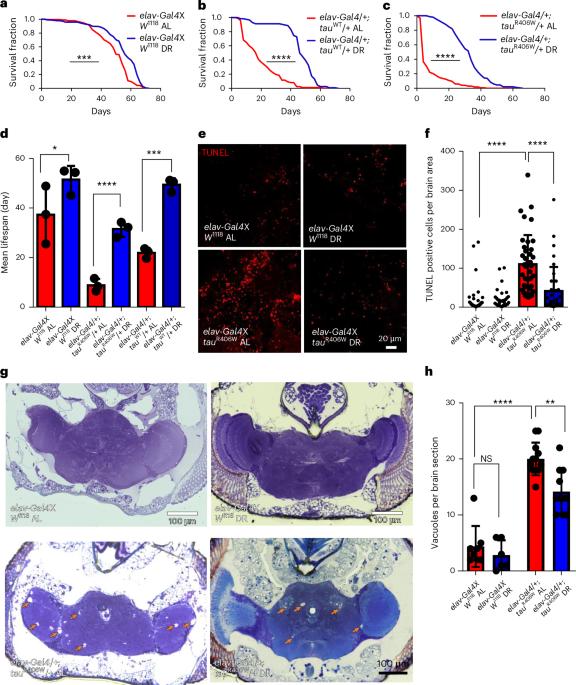Neuronal glycogen breakdown mitigates tauopathy via pentose-phosphate-pathway-mediated oxidative stress reduction
IF 20.8
1区 医学
Q1 ENDOCRINOLOGY & METABOLISM
引用次数: 0
Abstract
Tauopathies encompass a range of neurodegenerative disorders, such as Alzheimer’s disease (AD) and frontotemporal lobar degeneration with tau inclusions (FTLD-tau), for which there are currently no successful treatments. Here, we show impaired glycogen metabolism in the brain of a tauopathy Drosophila melanogaster model and people with AD, indicating a link between tauopathies and glycogen metabolism. We demonstrate that the breakdown of neuronal glycogen ameliorates the tauopathy phenotypes in flies and induced pluripotent stem cell (iPSC)-derived neurons from people with FTLD-tau. Glycogen breakdown redirects glucose flux to the pentose phosphate pathway and alleviates oxidative stress. Our findings uncover a critical role for the neuroprotective effects of dietary restriction (DR) by increasing glycogen breakdown. Mechanistically, we show a potential interaction between tau protein and glycogen, suggesting a vicious cycle in which tau binding promotes glycogen accumulation in neurons, which in turn exacerbates tau accumulation which further disrupts cellular homeostasis. Our studies identify impaired glycogen metabolism as a key hallmark for tauopathies and offer a promising therapeutic target in tauopathy and other neurodegenerative diseases. Bar et al. show that neuronal glycogen feeds the pentose phosphate pathway and contributes to redox homeostasis, thus counteracting tauopathy-associated oxidative stress in Drosophila melanogaster.


神经元糖原分解通过戊糖-磷酸盐途径介导的氧化应激减少减轻tau病
tau病包括一系列神经退行性疾病,如阿尔茨海默病(AD)和额颞叶变性伴tau内含物(FTLD-tau),目前尚无成功的治疗方法。在这里,我们展示了牛头病黑腹果蝇模型和AD患者大脑中的糖原代谢受损,表明牛头病和糖原代谢之间存在联系。我们证明,神经元糖原的分解改善了果蝇和来自FTLD-tau患者的诱导多能干细胞(iPSC)来源的神经元的tau病表型。糖原分解将葡萄糖通量重定向到戊糖磷酸途径并减轻氧化应激。我们的研究结果揭示了饮食限制(DR)通过增加糖原分解对神经保护作用的关键作用。在机制上,我们显示了tau蛋白和糖原之间潜在的相互作用,表明tau结合促进糖原在神经元中积累的恶性循环,而糖原在神经元中积累反过来又加剧了tau蛋白的积累,从而进一步破坏细胞稳态。我们的研究确定糖原代谢受损是牛头病的关键标志,并为牛头病和其他神经退行性疾病提供了一个有希望的治疗靶点。
本文章由计算机程序翻译,如有差异,请以英文原文为准。
求助全文
约1分钟内获得全文
求助全文
来源期刊

Nature metabolism
ENDOCRINOLOGY & METABOLISM-
CiteScore
27.50
自引率
2.40%
发文量
170
期刊介绍:
Nature Metabolism is a peer-reviewed scientific journal that covers a broad range of topics in metabolism research. It aims to advance the understanding of metabolic and homeostatic processes at a cellular and physiological level. The journal publishes research from various fields, including fundamental cell biology, basic biomedical and translational research, and integrative physiology. It focuses on how cellular metabolism affects cellular function, the physiology and homeostasis of organs and tissues, and the regulation of organismal energy homeostasis. It also investigates the molecular pathophysiology of metabolic diseases such as diabetes and obesity, as well as their treatment. Nature Metabolism follows the standards of other Nature-branded journals, with a dedicated team of professional editors, rigorous peer-review process, high standards of copy-editing and production, swift publication, and editorial independence. The journal has a high impact factor, has a certain influence in the international area, and is deeply concerned and cited by the majority of scholars.
 求助内容:
求助内容: 应助结果提醒方式:
应助结果提醒方式:


